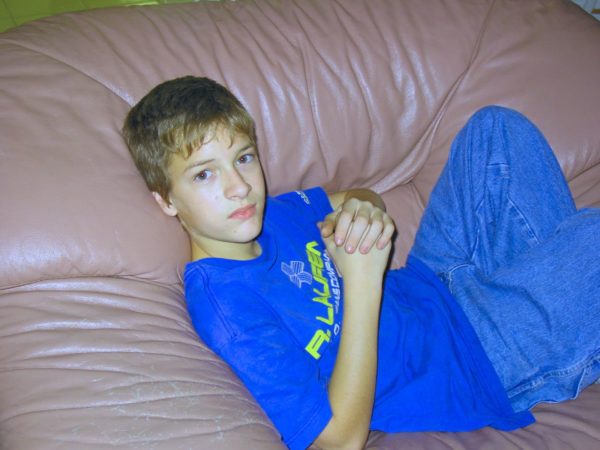I noticed we’ve been getting TONS of new users over the past week. Where are you coming from, guys? An article? A blog? A website? Come clean!
Enjoy part four of this fascinating interview series. What I love about this particular interview is that it has stimulated such interesting discussion, and, for me, this has led to healthy introspection. Tomorrow in the wee hours of the morning I leave for Las Vegas for my 30th wedding anniversary. What is that, broken glass? Belly button lint? Anyway, I will post Part Five tomorrow. Promise.
After the interview, there’s the link for the Sean and Jen radio show. I missed it, but I’m sure Erik and Jamie earned a standing ovation.
Me: Okay. Tell us about your decision to help the dying. Was there some specific experience that led you to that and to create a hospice?
Mother Teresa: Yes. I didn’t want them to die on the streets. I saw it too many times. Being in my center was better than dying in a dirt-covered street, but what others were trying to compare it to was a structured medical center. The two cannot be compared in that way.
Me: What do you think about the hospice system in the United States.
Jamie: She smiles!
Mother Teresa: I’m very proud of the hospice system.
Me: Me too. Now, one more question regarding the criticism levied against you. The Secretary of the Vishnu Hindu said that your first duty was always to The Church and the social service was incidental, and he accused you of favoring Christians, conducting baptisms on the dying. Was that true? If so, what was the spiritual importance, if any, of this controversy?
Mother Teresa: My life was dedicated to The Church first, this is very true. My social duties and services were second to that. The favoritism to Catholic believers to non-Catholics—I don’t believe that was true. If there were people on the streets or people I was caring for that did want baptism, I would do so. And because this was outside of the normal care system, it did look like I was playing favorites or doing too much to one instead of the other. But if you came to me and asked for it, I would do so. If you did not ask for it, I would not do so, so an observer would clearly see I was doing something “extra” for some that I wasn’t doing for others. It was not because of my personal opinion. It was because of the individual need of the person.
Me: Was there some sort of spiritual reason for this criticism?
Mother Teresa: When you choose to come to Earth, you have to agree to embrace the good and the bad. No matter how well you can walk on Earth without leaving a footprint, someone can find a way to bring out the worst in who they think you are or what they think you have done. It was my job to embrace the critique, to not fight against it. It was my job to be seen as a human and not as an angel on Earth. These critiques, these attacks, helped serve me, and my purpose is to be here.
Me: All of this criticism—was there some sort of spiritual lesson for the masses, not just you, personally?
Mother Teresa: Yes. Critique is more marketable.
Me: Why would that help?
Mother Teresa: Then more people would know about the need in these other countries.
Me: So, drawing attention to the poverty and the sick and the hungry and the orphans, etc.
Mother Teresa: Yes.
Me: Okay. How do you feel about the fact that the Archbishop of Calcutta ordered an exorcism on you when your health was declining?
Jamie (giggling): Really?
Me: Yes! Were you possessed, Mother Teresa?
I giggle.
(Pause)
Jamie: There’s a tiny little giggle in her voice.!
Mother Teresa (giggling): No. No.
Erik (to Mother Teresa): Was that based on anything you did? You know, did you start like bad-mouthing Jesus?
Jamie: Erik is just ranting on like this, and you can tell she’s handling him fine, but she’s giggling a little bit that he would, you know, casually speak to her in this way. It’s really interesting.
Mother Teresa: No, I did not say anything against the name of God or Jesus. It was simply—
Jamie: Oh! She had so many attempts to die, but she kept on living, and so it was kind of that they thought maybe something was stopping her from dying—keeping her alive and suffering, to condemn her to this place where she couldn’t reach God and Jesus. So, they ordered the exorcism just in case. In case there was anything holding her back from dying.
Me: Yeah. Guess you gotta cover al your bases.
Jamie (chuckling) Cover everything!
Me: They say you opposed the Hindu right. Why is that? Not a conservative, huh?
Mother Teresa: It was a personal choice. I had to go with what I felt was true within me. I wasn’t going to speak up for or support things I didn’t believe in.
Jamie: Erik is asking her about details, you know and how did she stand on it and feel about it and she’s shutting him down, like “this is not important.” “This is not going to serve anyone.”
Me: Okay. There were times when your faith was really tested. If fact, you even questioned the existence of God. Why did this occur and what renewed your faith?
Mother Teresa: Every man’s faith will be measured on Earth.
Erik: And women!
Mother Teresa: Do not be embarrassed by him. He speaks his truth!
Me (in jest): That’s true. But we often are. He can be a little brat!
Mother Teresa: It was my chance for my faith to be measured. Through that, I realized I was stronger than I thought. It encouraged me to do more global work than in local work. You asked another question beside my faith being challenged?
Me: When renewed your faith?
Mother Teresa: Rediscovering the trust in myself.
Me: Was there one thing that made you wonder whether God existed?
Mother Teresa: There were many, and when I was living, I was simply human, and I had the discipline and strength to stand on top of my faith instead of beneath it. It made me seem out of the ordinary or extraordinary though I never thought I was.
Jamie: Erik is asking her about those many things, and she’s bringing up the internal struggles she had with those daily questions of why. Why this baby have to be neglected? Why can’t we fee them? Why does love not exist here? She had, as Erik’s telling me, she had a lot of strength in her faith that if she believed in it enough and created it, then it would happen, and there were many times when it would fall apart.
Mother Teresa: I often had doubts about whether I was doing the work properly toward Jesus’s liking, and this is what would create small holes for me to doubt my belief. I think if there is any man on Earth—
Erik: Or woman!
Jamie giggles.
Mother Teresa: –that does not have holes in their belief, then they are not willing enough to look at the entire picture. They are narrow-sighted, and if they misstep or step slightly to the side, they might fall off that balancing act they’ve created for themselves and fall quickly into reality. It is important to look at the entire picture and not just what you want it solely to be. In this respect, I was human.
One more thing! If any of you have a connection with someone notable who might be willing to write an endorsement for my book, could you hook me up? If so, give me a holler: emedhus@gmail.com.



